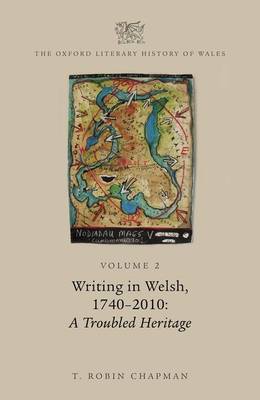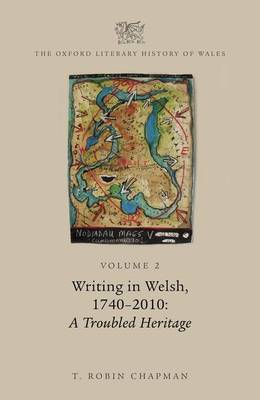
Je cadeautjes zeker op tijd in huis hebben voor de feestdagen? Kom langs in onze winkels en vind het perfecte geschenk!
- Afhalen na 1 uur in een winkel met voorraad
- Gratis thuislevering in België vanaf € 30
- Ruim aanbod met 7 miljoen producten
Je cadeautjes zeker op tijd in huis hebben voor de feestdagen? Kom langs in onze winkels en vind het perfecte geschenk!
- Afhalen na 1 uur in een winkel met voorraad
- Gratis thuislevering in België vanaf € 30
- Ruim aanbod met 7 miljoen producten
Zoeken
Oxford Literary History of Wales
Volume 2. Writing in Welsh, C. 1740-2010: A Troubled Heritage
T Robin Chapman
€ 241,95
+ 483 punten
Omschrijving
This book represents the longest single-volume work on modern Welsh literature ever published, and proceeds from two broad perspectives. First, avoiding the traditional intrinsic and extrinsic approaches to literary history as the story of literary forms, authors, other literatures, or events,
it places readers, where possible, at its centre. The definition of readers adopted here is broad: fictional and non-fictional, derived from letters, reviews, and criticism, as well as audiences addressed in prefaces, those mediated through authors' consciousness, or implied, assumed, postulated,
created, idealized, chided, encouraged, and reviled, and treated as experts or pupils, arbiters, or dupes. Welsh literature is approached not as the sequential product of authors writing under particular circumstances but as material interpreted and reinterpreted, discovered, and rediscovered, by
reading communities across time. Second, it seeks to interpret Welsh literature as shaped in turn by a series of concerns and preconceptions that have governed production and reception through most of the period covered in this book. These include, for instance, the fact that Welsh literature has
been read as a crisis of cultural communicability between writers and readers; that writers in a largely amateur literary culture have been regarded as benefactors; that there is a lack of material to read; that, in a bilingual milieu, there is an inescapable relationship between Welsh and English
literature; that a language with widely differing spoken and written registers is preoccupied with notions of correctness and appropriateness.
it places readers, where possible, at its centre. The definition of readers adopted here is broad: fictional and non-fictional, derived from letters, reviews, and criticism, as well as audiences addressed in prefaces, those mediated through authors' consciousness, or implied, assumed, postulated,
created, idealized, chided, encouraged, and reviled, and treated as experts or pupils, arbiters, or dupes. Welsh literature is approached not as the sequential product of authors writing under particular circumstances but as material interpreted and reinterpreted, discovered, and rediscovered, by
reading communities across time. Second, it seeks to interpret Welsh literature as shaped in turn by a series of concerns and preconceptions that have governed production and reception through most of the period covered in this book. These include, for instance, the fact that Welsh literature has
been read as a crisis of cultural communicability between writers and readers; that writers in a largely amateur literary culture have been regarded as benefactors; that there is a lack of material to read; that, in a bilingual milieu, there is an inescapable relationship between Welsh and English
literature; that a language with widely differing spoken and written registers is preoccupied with notions of correctness and appropriateness.
Specificaties
Betrokkenen
- Auteur(s):
- Uitgeverij:
Inhoud
- Aantal bladzijden:
- 344
- Taal:
- Engels
- Reeks:
Eigenschappen
- Productcode (EAN):
- 9780199562268
- Verschijningsdatum:
- 8/05/2020
- Uitvoering:
- Hardcover
- Formaat:
- Genaaid
- Afmetingen:
- 157 mm x 236 mm
- Gewicht:
- 657 g

Alleen bij Standaard Boekhandel
+ 483 punten op je klantenkaart van Standaard Boekhandel
Beoordelingen
We publiceren alleen reviews die voldoen aan de voorwaarden voor reviews. Bekijk onze voorwaarden voor reviews.









